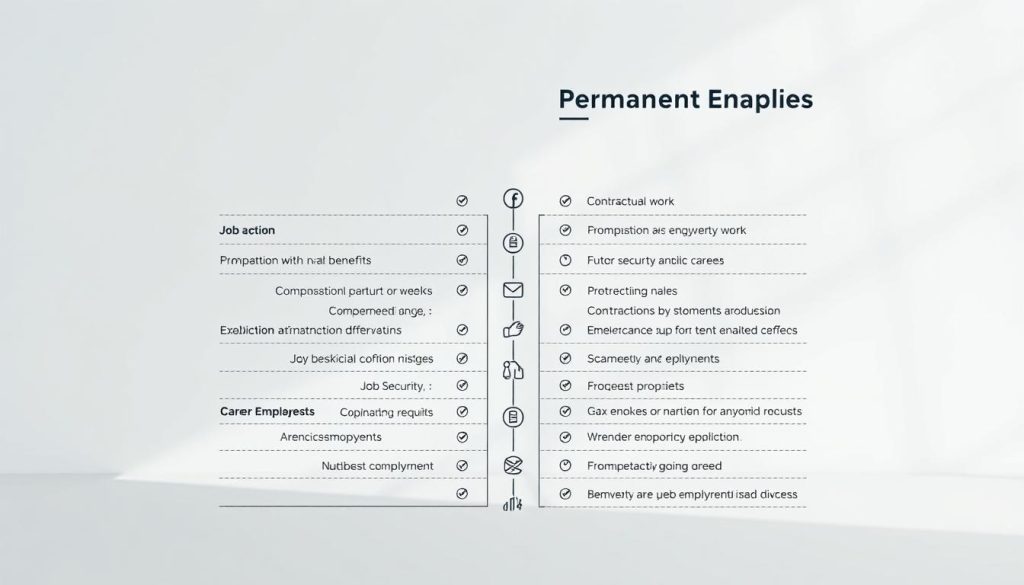Imagine waking up knowing your next project could redefine your career – but also wondering where stability fits into this equation. This duality defines modern professional life for millions navigating contractual arrangements. Whether you’re a designer craving creative freedom or an IT specialist seeking diverse challenges, understanding these agreements is your compass in today’s evolving job market.
Contract-based roles now power industries from tech to healthcare, offering clear timelines and project-specific focus. Unlike traditional employment, these arrangements create mutual understanding through detailed written terms. A 2023 study revealed 42% of French professionals have engaged in contract work, valuing its transparency and skill-building potential.
Yet questions linger. How do compensation structures differ? What safeguards exist? We’ll guide you through the essentials – duration clauses, deliverables, and termination protocols – while addressing the emotional reality of balancing flexibility with security. Your career deserves both adventure and anchor points.
Table of Contents
Key Takeaways
- Temporary roles with defined timelines dominate modern hiring trends
- Written agreements establish concrete expectations for all parties
- Flexibility often trades off with long-term benefits
- Multiple industries now rely on project-based talent
- Understanding terms empowers better career decisions
Introduction to Contractual Work
The traditional 9-to-5 model now competes with dynamic arrangements reshaping careers across industries. Over 73% of U.S. professionals engage in freelance or contract roles, driven by demands for specialized skills and remote flexibility. This shift reflects deeper changes in how businesses and individuals approach productivity in our evolving economy.
Tech sectors illustrate this transformation vividly. Software developers increasingly choose project-based contracts to offset rising costs while maintaining control over their schedules. « The balance between financial stability and personal freedom isn’t a compromise anymore – it’s a strategy, » notes a Paris-based tech recruiter.
Three factors fuel this trend:
- Economic pressures requiring diversified income streams
- Employers seeking niche expertise for short-term goals
- Digital tools enabling seamless collaboration across borders
France mirrors these patterns, with 58% of professionals considering contract roles for career growth. While traditional employment offers structure, the gig economy provides agility – a trade-off many now prioritize in uncertain markets.
Understanding the Basics of Contract Work
Over 35% of French professionals have engaged in contract-based roles this year, drawn to their blend of flexibility and focused collaboration. These arrangements center on defined objectives rather than open-ended commitments, creating clear pathways for both specialists and organizations.
What Constitutes Contractual Work
At its core, this model connects skilled individuals with time-bound missions. Professionals tackle specific projects – like developing software modules or managing marketing campaigns – with compensation tied to milestones. Unlike permanent roles, these engagements prioritize deliverables over duration, often lasting 3-12 months.
Three pillars define these agreements:
- Precise scope outlining required tasks
- Transparent payment schedules (hourly or project-based)
- Mutually agreed termination clauses
Key Features and Work Arrangements
Fixed-term contracts dominate sectors needing seasonal support, such as retail or tourism. « Our Bordeaux vineyard uses six-month contracts for harvest specialists, » explains a Rhône Valley HR manager. « It ensures expertise when we need it most. »
Rolling contracts suit ongoing needs like IT support, renewing automatically unless either party gives notice. This structure provides stability for contractors while letting companies adjust team sizes fluidly.
Modern platforms now streamline these partnerships, with 68% of French contractors reporting easier access to project opportunities through specialized marketplaces. Whether you’re designing websites or consulting on sustainability initiatives, understanding these frameworks helps navigate today’s dynamic professional landscape.
Defining Contractual Work in the Modern Economy
The employment landscape now thrives on specialized collaborations that outpace traditional job growth by 40%. Over 50 million Americans engage in these arrangements, while French companies increasingly adopt similar models to stay competitive. This shift reflects a fundamental rethinking of how businesses achieve goals while managing resources.
Exploring Temporary vs. Project-Based Roles
Two primary models dominate contract engagements:
| Role Type | Duration | Focus | Industry Examples |
|---|---|---|---|
| Temporary | Weeks to 6 months | Filling staffing gaps | Retail, Hospitality |
| Project-Based | 3-18 months | Delivering specific outcomes | Tech, Marketing |
Temporary positions often address sudden demand spikes – like holiday staffing for Parisian luxury stores. These roles provide quick solutions but limited strategic impact. In contrast, project-based engagements (common in engineering and design) require deep expertise to complete defined objectives, such as launching a mobile app or restructuring supply chains.
France’s interim staffing sector grew 12% last year, reflecting businesses’ need for adaptable talent strategies. Meanwhile, 68% of project specialists report higher earnings compared to traditional roles, according to 2023 labor surveys.
Economic drivers like remote work technologies and global competition make these models essential. Companies gain access to top-tier skills without long-term overhead, while professionals build diverse portfolios. This symbiotic relationship reshapes how we define career success in turbulent markets.
Comparing Contractual Work and Permanent Employment

Career choices today often present a crossroads between structure and autonomy. Professionals weigh predictable benefits against fluid opportunities, creating complex decisions shaped by personal priorities and market realities. Let’s examine how these paths differ in practice.
Benefits and Drawbacks
Project-based roles typically offer 15-30% higher hourly rates than permanent positions, according to 2023 French labor data. This model suits those valuing schedule control and skill diversification. However, traditional interim staffing solutions in France show 42% of specialists miss employer-sponsored healthcare after six months.
| Aspect | Contract Roles | Permanent Positions |
|---|---|---|
| Compensation | Higher hourly rates | Salary + bonuses |
| Schedule | Self-managed hours | Fixed office hours |
| Benefits | Limited to none | Full package |
| Career Growth | Portfolio diversity | Promotion paths |
Job Security and Flexibility Considerations
Permanent employees enjoy unemployment protections covering 70-90% of previous income in France. Contract specialists maintain freedom to choose projects but face income gaps between engagements. “I trade stability for creative control,” shares a Lyon-based marketing consultant. “Three-month contracts let me pivot industries faster.”
Young professionals increasingly prioritize adaptability – 61% under 35 prefer varied experiences over fixed roles. Yet parents often value the childcare subsidies and paid leave from traditional employment. Your ideal choice depends on life stage and risk tolerance.
Types and Variations of Contract Work
Modern workforce solutions require understanding four primary contractual frameworks. These models cater to distinct business needs while offering professionals customized career paths. Let’s explore how each structure creates unique opportunities in France’s evolving job market.
Fixed-Term, Temporary, Freelance, and Consulting Contracts
Fixed-term agreements outline specific durations – ideal for seasonal retail positions or annual marketing campaigns. A Marseille tech firm recently used six-month contracts to develop AI translation tools, ensuring focused talent deployment.
Temporary roles address sudden demand spikes. Parisian luxury hotels frequently hire event staff through three-week agreements during fashion weeks. These arrangements provide quick staffing solutions without long-term commitments.
Freelance professionals enjoy project diversity. Graphic designers often manage multiple clients simultaneously, building portfolios while controlling workloads. « I balance app designs for startups with branding projects for museums, » shares a Lyon-based creative.
Consulting contracts leverage niche expertise. Financial analysts might guide companies through mergers for 12-18 month periods. These roles typically offer 25-40% higher rates than standard positions, reflecting their strategic value.
Role-Specific Contract Examples
| Industry | Contract Type | Typical Duration |
|---|---|---|
| Software Development | Project-Based | 9-14 months |
| Healthcare | Temporary | 1-6 months |
| Marketing | Freelance | Per Campaign |
| Management | Consulting | 6-24 months |
This structured approach helps professionals match their skills with suitable opportunities. Whether securing short-term income or building long-term expertise, understanding these models empowers informed career decisions.
The Impact of the Gig Economy on Contractual Work
Global workforce patterns now shift like sand dunes, reshaping careers and corporate strategies overnight. The gig economy fuels this transformation, projected to reach $1.86 trillion by 2031. Professionals leverage digital platforms to convert specialized expertise into strategic career moves, while companies access global talent pools with surgical precision.
Emerging Trends and Online Platforms
Three developments redefine how talent connects with opportunities:
- AI-powered matching systems on platforms like Upwork and LinkedIn
- Blockchain contracts ensuring transparent payment flows
- Remote collaboration tools enabling cross-border projects
These innovations reduce project start-up times by 40% compared to traditional hiring. A Paris-based UX designer recently secured four international clients through specialized freelance platforms, completing projects for Milanese fashion houses and Canadian tech startups simultaneously.
Specialized Skills and Market Demand
Tech expertise commands premium rates in today’s gig landscape:
| Skill Category | Average Hourly Rate | Project Duration |
|---|---|---|
| AI Development | €85-€120 | 3-9 months |
| Data Analytics | €65-€95 | 1-6 months |
| Digital Marketing | €50-€80 | Ongoing |
This demand creates opportunities for professionals to monetize niche capabilities. « My cybersecurity certifications tripled my contract offers, » shares a Marseille-based IT consultant. As automation advances, human skills in creative problem-solving and emotional intelligence become irreplaceable assets in the gig ecosystem.
Legal Aspects and Worker Rights in Contractual Work
Legal frameworks form the bedrock of successful professional collaborations. Both employers and specialists benefit from understanding protections that ensure fairness while fostering productivity.
Essential Agreements and Protections
Written agreements serve as vital safeguards in temporary roles. French law mandates these documents must specify:
- Clear project scope and deliverables
- Compensation structure and payment timelines
- Termination conditions for both parties
Workers retain fundamental rights regardless of contract type. These include access to safe environments, protection from discrimination, and timely payments. A recent Paris court ruling awarded €14,000 to a marketing consultant for unpaid invoices – demonstrating legal systems’ role in enforcing agreements.
Cross-Border Regulatory Frameworks
France’s structured approach contrasts with US flexibility. The CDI (permanent contract) remains preferred, while CDD (fixed-term) applies only to:
- Seasonal industries like agriculture
- Employee replacements during medical leaves
- Short-term project surges
US regulations permit broader use of temporary roles but offer fewer automatic protections. « French workers enjoy stronger safety nets, » notes labor attorney Élise Dubois. « Employers must justify fixed-term arrangements or face conversion mandates to permanent status. »
Tax Considerations and Self-Employment Responsibilities

Navigating tax obligations becomes your new reality when operating outside traditional employment structures. Unlike salaried workers, self-employed professionals carry full responsibility for calculating and remitting payments – a critical skill for financial stability.
Managing Self-Employment Taxes
France requires independent workers to make quarterly estimated tax payments based on projected annual income. This system helps avoid year-end surprises but demands disciplined budgeting. Key steps include:
- Setting aside 22-25% of income for social charges
- Tracking business expenses in real-time
- Using approved accounting software for VAT calculations
Strategies for Saving on Taxes and Deductions
Smart deduction planning can reduce taxable income by up to 30% for eligible professionals. Common write-offs include:
- Home office costs (€580 maximum without receipts)
- Professional training fees
- Equipment purchases under €500
“Digital platforms simplify expense tracking,” notes a Lyon-based financial advisor. “Mobile apps now auto-categorize receipts using AI – a game-changer for busy specialists.”
Those exploring self-employed contract work should consult tax professionals to optimize their fiscal strategy. Proper planning turns tax compliance from a burden into a strategic advantage.
Health Insurance and Other Benefits for Contract Workers
Navigating benefits as an independent professional feels like building a safety net from scratch. Unlike traditional employees, specialists must secure their own health coverage and retirement plans. This financial puzzle requires strategic planning to balance costs with essential protections.
Challenges of Missing Traditional Employee Benefits
Private health plans cost 30-50% more for individuals than group rates. Retirement savings become a solo mission without employer-matched contributions. These gaps create long-term risks:
- Average French contractor spends €300/month on basic health coverage
- Only 28% contribute regularly to retirement funds
- No paid sick leave compounds income instability
| Coverage Type | Average Cost (Monthly) | Key Limitations |
|---|---|---|
| Individual Plans | €250-€400 | Higher deductibles |
| Professional Association | €180-€300 | Membership required |
Alternatives and Private Insurance Options
Specialized solutions help bridge the protection gap. France’s Volontariat Territorial en Entreprise offers subsidized plans for certain contractors. Consider these strategies:
- Health savings accounts paired with high-deductible plans
- Group rates through freelance unions like URSAAF
- Private retirement vehicles (PER) with tax advantages
« Treat benefits as non-negotiable project deliverables. Allocate 25% of each payment to health and retirement funds. »
Comparing total compensation requires factoring in these hidden costs. Permanent roles might offer lower pay but greater security. Your career path should align with both professional goals and personal safety needs.
Practical Tips for Succeeding in Contractual Work
In France’s dynamic professional landscape, creating lasting success in project-based roles requires intentional strategies. Specialists who thrive combine relationship-building expertise with smart financial practices. These dual focus areas transform short-term engagements into sustainable career paths.
Building Connections That Matter
Industry events and online communities serve as springboards for opportunity. Attend sector-specific conferences in Paris or Lyon to meet decision-makers. Join niche forums where 68% of French professionals discover project leads. LinkedIn remains essential – optimize profiles with keywords clients use when searching for your skills.
Visibility and Fiscal Responsibility
Develop a personal brand through case studies showcasing measurable results. Curate an online portfolio highlighting diverse industry experience. For financial stability:
- Allocate 30% of income to taxes and retirement
- Compare private health plans through professional unions
- Use accounting apps to track deductible expenses
Regular skill audits ensure you remain competitive. Pair technical abilities with soft skills like cross-cultural communication – a key differentiator in France’s globalized market.
FAQ
How does contract work differ from traditional employment?
Contract roles focus on specific projects or time-bound tasks, offering flexibility but fewer employer-provided benefits. Unlike permanent positions, these arrangements prioritize specialized skills over long-term commitments, allowing professionals to control their workload and client relationships.
What tax strategies help self-employed contractors save money?
Track business expenses like software, home office costs, and professional development. Consider quarterly estimated tax payments to avoid penalties. Retirement plans like SEP-IRAs or solo 401(k)s also reduce taxable income while building long-term savings.
Can contract workers access affordable health insurance?
Yes. Private plans through Healthcare.gov or professional organizations like Freelancers Union offer coverage. Some opt for Health Savings Accounts (HSAs) paired with high-deductible plans to manage costs while saving tax-free for medical needs.
What legal protections exist for independent contractors?
Contracts define payment terms, project scope, and termination clauses. While labor laws vary, platforms like Upwork provide dispute resolution tools. In France, auto-entrepreneur status simplifies registration and offers social security options.
How can freelancers maintain steady income streams?
Diversify clients across industries and use platforms like Toptal for high-value projects. Build a financial buffer covering 3-6 months of expenses. Regularly update portfolios and leverage LinkedIn to showcase niche expertise to potential employers.
Do contract roles lead to permanent job opportunities?
Many companies use contract-to-hire models to evaluate talent. Demonstrating reliability and skill alignment during projects often opens doors to full-time offers. However, this varies by industry and employer hiring practices.
What tools help manage multiple contract projects efficiently?
Use Trello or Asana for task tracking, FreshBooks for invoicing, and Calendly for scheduling. Time-tracking apps like Toggl ensure accurate billing, while Grammarly maintains professional communication across client interactions.





